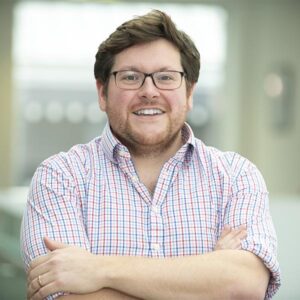LGBTQ+ champion wins Royal Society of Edinburgh medal

Scientific pioneers recognised
In October, the Royal Society of Edinburgh (RSE), Scotland’s National Academy, announced the six winners of its highly prestigious medals.
The RSE medals recognise exceptional achievement in science, academia and public engagement.
University of Edinburgh LGBT+ champion awarded medal
Dr Luke Graham Boulter, of the MRC Institute of Genetics and Molecular Medicine at the University of Edinburgh, was awarded the RSE Patrick Neill Medal.
Dr Boulter received the award for his discovery of a number of processes that are required for cancers to develop during chronic disease, and his identification of a series of therapeutically targetable signals that cancers use to grow.
Being awarded the Patrick Neill medal from the Royal Society of Edinburgh is a real honour and I am delighted to see such a prestigious organisation celebrating and supporting the LGBTQ+ community in science”.
- Dr Luke Boulter
Dr Boulter’s LGBTQ+ work

Dr Boulter is also an active champion of LGBTQ+ diversity in medicine and science and is a member of the Royal Society Diversity Committee.
In an interview last year with the Royal Society, Dr Boulter talks about his work and being a part of the LGBTQ+ scientific community.
How can scientists be great allies for their LGBT+ colleagues?
“Just treat them like people. Recognising diversity gives you better results and better science. LGBT+ people have a different perspective and those experiences are important. Just embrace that and enjoy the diversity.”
Looking back, what advice or words of encouragement would you give to your younger self, or to aspiring LGBT+ scientists?
“I would say to my younger self: be proud of who are you and be comfortable with who you are because it’s OK.
To other young LGBT+ scientists: I would say that this is a great career- you will discover things about yourself and the world that no one else knows.
So be a scientist – it’s inclusive, it’s friendly and you can be who you want to be here.”
Other RSE award winners
The other winners of this year’s RSE medals are:
- RSE Royal Medal: Professor Peter Kennedy of the Institute of Infection Immunity and Inflammation at the University of Glasgow
- RSE Lord Kelvin Medal: Professor Alan William Hood of St Andrews University
- RSE Sir James Black Medal: Professor Ian David Duncan of the University of Wisconsin-Madison
- RSE Innovator’s Prize for Public Engagement: Dr Paul O’Mahoney, a Post-Doctoral Research Assistant working within the Photobiology Unit at Dundee’s Ninewells Hospital
- RSE Senior Prize for Public Engagement: Professor Niamh Nic Daéid, Director of The University of Dundee’s Leverhulme Research Centre for Forensic Science
This year’s medallists have all made truly exceptional contributions to their own field of science. This year’s recipients join a small but brilliant group of pioneers that have been advancing learning and knowledge since the RSE’s Royal Charter was awarded in 1783.
Scotland can be proud that such a cohort of brilliant talent, making a vast difference to lives all over the world, can be found within our small nation.
- Professor Dame Anne Glover, President of the RSE
Related links
Scientific pioneers recognised by 2020 Royal Society of Edinburgh Medals
The Royal Society Blog: Celebrating LGBT History Month





